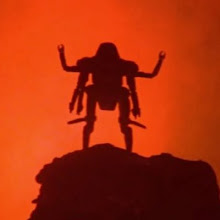HOLDEN But the worst movie, undoubtedly — and all the critics agree with me — was "Gods and Generals." And to sit through four hours of it! It was absolutely ludicrous in every way.Their cold assessment of Cold Mountain was hasty, but the critics could not be more correct in their dismissal of Gods & Generals. In the eyes of G&G director Ronald F. Maxwell, the Civil War was simply an event centering around the proud bluster and vainglorious speechifying of great men, all of whom were mere victims of historical happenstance. This was a film about rhetoricians who paused to bloviate as their troops, just props to them, were obliterated. As every gentrified gentleman is a honorable prisoner of fate, no one is a perpetrator of an evil institution, no one is a profiteer, no one is overly ambitious or reckless. Indeed, no one in the film -- on either side of the fight -- appears to be be motivated by malice or ill will. In an effort not to offend any who might harbor a nostalgia for the losing side, the film presented no one - certainly not a general - as a villain.
SCOTT And oddly, audiences didn't go for it.
HOLDEN They promoted it quite well——
SCOTT And it was still a bomb.
HOLDEN A total, total bomb. But if "Gods and Generals" tried to get the Civil War too literally — much, much, much too literally — "Cold Mountain" erred in the other direction, trying to make it into "Reds" or "Dr. Zhivago" or something like that. It didn't feel authentic. That's one of many things that bothered me about "Cold Mountain," which is also a disappointment in my book, but a noble one.
The facts, as presented in the film, also seemed a bit questionable. In much of G&G, the battlefields are portrayed as eerily silent -- the wounded do not cry out in pain for their mothers or sweethearts. There was no cacophony on the battlefields, which were littered with the mortally wounded. The few African American characters who appear were depicted mostly as sympathetic to the Confederacy or its partisans, which is curious indeed. While, of course, conversational stylings of the 1860s were likely far different than those of our postmodern 2000s, surely even then individuals spoke to each other, rather than speechifying at each other.
Spoke Joshua Lawrence Chamblerlain, played by Jeff Daniels, during the course of the film:
All these thousands of men. Many of the not much more than boys. Each one of them some mothers' son, some sisters' brother, some daughters father. Each one of them a whole person loved and cherished in some home far away. Many of them will never return. An army is power.Its entire purpose is to coherse others. This power can not be used carelessly or recklessly. This power can do great harm. We have seen more suffering than any man should ever see, and if there is going to be an end to it, it must be an end that justifies the cost. Now, somewhere out there is the Confederate army. They claim they are fighting for their independence, for their freedom. Now, I can not question their integrity. I believe they are wrong but I can not question it. But I do question a system that defends its own freedom while it denies it to an entire race of men. I will admit it Tom war is a scruge, but so is slavery. It is the systematic cohersion of one group of man over another. It has been around since the book of Genesis it exists in every corner of the world, but that is no excuse for us to tolerate it here when we find it right infront of our very eyes in our own country. As God as my witness there is no one I hold in my heart dearer than you. But if your life, or mine,is part of the price to end this curse and free the negro, then let God's work be done.Yikes.
G&G lasts for an almost unendurable 231 minutes, a length that suggests an editor's outright timidity at the thought of confronting produce Ted Turner. Maxwell is also the perpetrator of the 1993 sequel/prequel Gettysburg, which came first in film but actually occurs after the events depicted in G&G. Interestingly, that means that in G&G the actors are ten years older in scenes that take place but a year before the events of the 1993 film. Maxwell's IMDB entry reveals that he had not directed a single film between 1993's Gettysburg and 2003's G&G.
It showed.





1 comment:
I endured Gettysburg in the theater, the film that dares to ask the audience "Yes, you're suffering, but do you think your suffering is anything compared to the ham-handed butchery we've got on display here?"
Certainly it was enough to keep me from wanting to pay the price of a ticket to Gods & Generals.
I have also been criticized for skipping "Cold Mountain", but it looked like a bunch of unhappy people being unhappy in the cold for two hours, and I wasn't sure, aside from Nicole Kidman acting like she's putting on a brave face, why I was supposed to see the thing.
Perhaps one day on cable. But I know I will most likely never watch G&G unless there's a dare or money involved.
Post a Comment